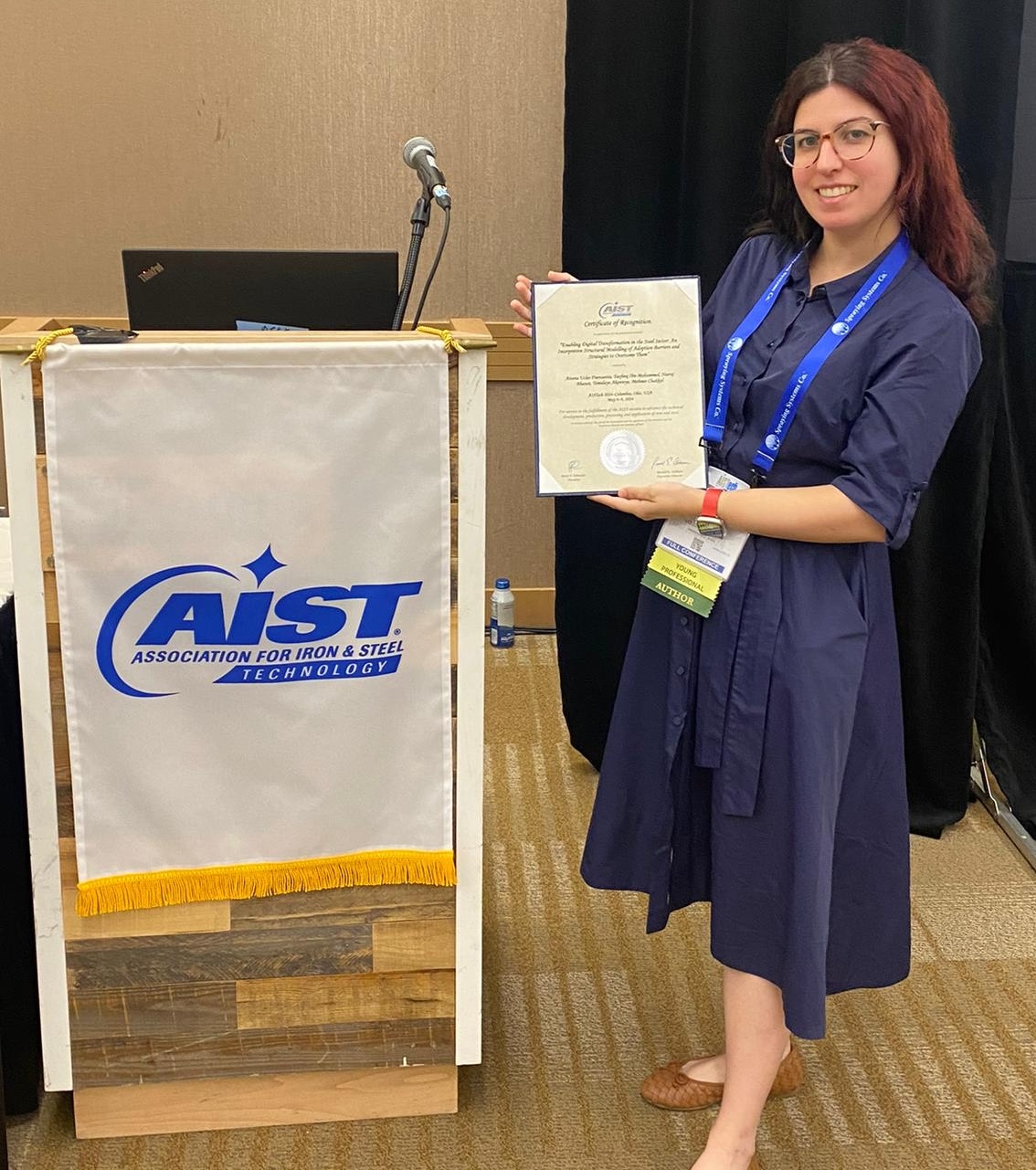Academics create digital roadmap to accelerate net zero steel in UK

Dr Aitana Uclés Fuensanta presenting at AISTech, the Iron and Steel Technology Conference
An innovative study supported by the InterAct programme has developed a strategic digital roadmap to fast-track the UK steel sector’s transition to net zero.
Developed by a team of academics from the University of Warwick, the research identifies the most pressing barriers to adopting Industrial Digital Technologies (IDTs) and provides actionable guidance on how these barriers can be overcome towards decarbonising one of the UK’s most vital industries.
The UK steel industry – comprising over 1,100 companies and contributing £2.3 billion to the national economy – is under increasing pressure to reduce its environmental footprint, accounting for a significant portion of global CO₂ emissions.
While steel can be endlessly recycled, its production remains energy-intensive, making the drive toward greener, more efficient practices an urgent national and global priority.
Supported by InterAct, part of the Made Smarter Innovation initiative, the research project explored how IDTs can be leveraged to support the industry’s shift to resource and energy efficiency (REE), with a special focus on overcoming sector-specific adoption challenges.
The result is a seven-layer hierarchical framework that maps the interdependencies between 12 critical barriers – including investment uncertainty, skills shortages, regulatory complexity, and environmental considerations – and provides clear priorities for policymakers and industry leaders.
Using Interpretive Structural Modelling (ISM) modelling technique complemented with MICMAC analysis, the research team – comprising Dr. Taofeeq Ibn-Mohammed, Dr. Mehmet Chakkol and Dr. Aitana Uclés Fuensanta with support from Dr. Temidayo Akenroye (University of Missouri–St. Louis) – not only identified what’s holding the sector back but laid out a practical roadmap for digital transformation.
Dr. Ibn-Mohammed said: “Our research provides targeted, actionable recommendations that empower decision-makers to focus their efforts where they’ll have the greatest impact. A strategic blend of policy reform, technological innovation, organisational change, and smart economic planning is key to overcoming these barriers and building a greener, more competitive steel industry.”
The team’s findings have already been well received, including at AISTech, the Iron and Steel Technology Conference in the U.S., where the research drew praise from international stakeholders. Plans are now underway to publish a dedicated practitioner’s report to further inform industry strategy and support cross-sectoral collaboration.
Dr. Aitana Uclés Fuensanta, the project’s lead researcher, added: “This is the first empirical analysis of its kind to map the causal relationships between barriers to IDT adoption. Our insights will enable stakeholders to prioritise action, share best practices, and drive meaningful progress toward net zero.”
In addition to transforming the steel sector, the methodologies developed through this research are already being applied to other industries, including ceramics and glass, reinforcing the UK’s leadership in industrial sustainability innovation.
Dr. Ibn-Mohammed concluded: “By addressing both the regulatory and operational challenges facing the sector, we can enable smarter, more adaptive policies and unlock the full potential of digital transformation in UK manufacturing.
InterAct is a Made Smarter Innovation-funded, Economic and Social Research Council-led network that brought together economic and social scientists, UK manufacturers, policymakers, and digital technology providers to address the human issues resulting from the diffusion of new technologies in industry.
With involvement in over 70 events both in-person and online, welcoming more than 2,000 stakeholders to engage and connect, InterAct has placed building the Network at the heart of their activities. With more than 750 network members, the community has proven to be a dynamic bridge between industry, policy and academia.
InterAct has funded 30+ projects spanning topics from Digital Change Management to sustainable steel manufacturing and public perceptions of manufacturing, bringing together 100+ researchers from more than 40 institutions.
InterAct also collated insights for UK manufacturing from the global manufacturing environment, leading research missions to engage with 150+ manufacturing and digital technology leaders in Singapore, Malaysia, India, Australia and Sri Lanka.
The Network recently received additional funding, totalling almost £1 million, aimed at supporting UK Small and Medium Enterprises (SMEs) with the effective adoption of new industrial digital technologies (IDTs) to improve sustainability in the manufacturing sector.
Professor Jill MacBryde, InterAct co-director from the University of Strathclyde, commented: “InterAct is committed to supporting innovative research that drives sustainable change across industries. The work undertaken by the University of Warwick team represents a crucial step towards a more sustainable future for the steel sector.”

















